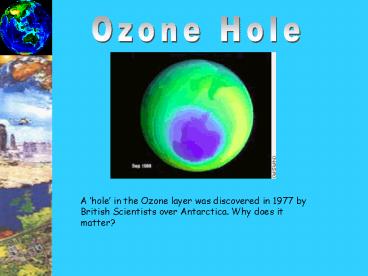Ozone Hole - PowerPoint PPT Presentation
1 / 5
Title:
Ozone Hole
Description:
Ozone Hole. A hole' in the Ozone layer was discovered in 1977 by British ... It is estimated that 1 in 2 Australians will develop some form of skin cancer in ... – PowerPoint PPT presentation
Number of Views:119
Avg rating:3.0/5.0
Title: Ozone Hole
1
Ozone Hole
A hole in the Ozone layer was discovered in
1977 by British Scientists over Antarctica. Why
does it matter?
2
What is the Ozone layer?
Ozone is O3. It is found 20-30km above sea level
in a thin layer. It is important to life on
earth, as it absorbs the damaging effects of
ultra-violet light coming from the sun.
Causes of the hole!
Release of CFC (chlorofluorocarbons). (aerosols,
fridges, foam packaging) Volcanic eruptions
(short term)
3
The Ozone hole is thinnest at the Poles (the
atmosphere is thinner here too). Once the CFCs
destroyed the ozone, it thinned. It is also
thinning over Europe, Australia and North America.
4
Effects
- An increased risk of sunburn, skin cancer,
cataracts and eye damage. Linked to blood cancers - Especially at risk are fair skinned children and
elderly people. But all are at risk. It is
estimated that 1 in 2 Australians will develop
some form of skin cancer in their lifetimes - The thinning of the ozone layer will also affect
animals and plant reproduction.
5
Can anything be done?
In 1987 the Montreal protocol was an
international agreement to phase out the use and
manufacture of CFCs
We must all take precautions to protect our skin,
wear UV resistant sunglasses, avoid sunburn!
In 1992, the Copenhagen agreement sought the
rapid end to using CFCs LEDCs have until 2010
The ozone hole may take 100 years to stabilise































